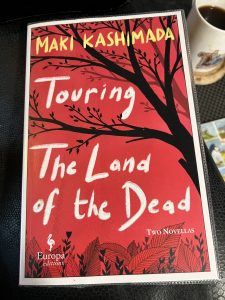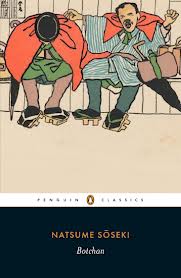Touring the land of the dead by Maki Kashimada
Japanese Novellas
Original title –Meido meguri (冥土めぐり)
Translator – Haydn Trowell
Source – Library book
This book has two novellas in it I am only talking about the first novella as the second novella is connected to Junchiro The Makioka sisters a book I have yet to read so I will borrow this again at some point when I have read that book and review the second novella 99 kisses. And this is the first book I have read by Maki Kshimada she has won a number of big prizes in Japan Initially she was into Russian literature and then went on to study French literature and she also became an orthodox Christian priest as well. She is married to a feel priest.
Before finding her current position at the children’s center, Natsuko had been working part-time at the ward office. The job involved hardly anything more than stapling together the bulletin for a group that the office ran for local children who weren’t attending school. She wasn’t an airline stewardess, but she was doing the kind of manual work that as a child she had always wanted, so she couldn’t say that her wish hadn’t come true. Once the bulletin was ready, she would be handed a bundle of papers to staple together.And the person that made that bulletin was Tachi
Natsuko has partime mindless work as she tries to get by
The story is about a couple that is down on their luck in life. Natsuko is living a hard life. In the past when her family had wealth. But that was a couple of generations ago. but the money disappeared when she was a kid and her life became hard she has her mother talking about the past and other family members leaning on her. then add to that she has a husband who because he has a degenerative disease had to stop working a number of years ago making their life even harder. so when she sees an ad for a spa weekend at a hotel that Her grandfather had visited with her mother she decides it is time she and her husband need time and maybe going there will kick memories of her family’s better times. So Natsuko and her husband Tachi yes he is struggling with illness but as they leave their life , I did wonder at this stage if the book could have taken a darker turn and maybe she had an idea of ending her life and her husband’s. Whilst she stay in the Hotel Natsuko looks at her world and her life and sees thing differently and her husband’s courage and positive nature rubs off on her. This is a story of a couple reconnecting the world outside who had driven a wedge but when they step back the world changes.
“No,” Natsuko replied sharply. “Not at all. My family is a bit weird. So it’s okay if you don’t want to marry me.”
“Huh?” The pork cutlet that Taichi had been holding in his chopsticks fell to the floor with a silent thud. “But you’re the one I’d be marrying, Nathan. What a strange thing to say! You were so nervous yesterday. You must be exhausted. Let’s put it behind us. Just try to imagine the wedding. You’ll be so beautiful!”
Her family has a number of characters that drag her down and lean on her she is a women drained by life.
Natsuko is at the end when she decides to head to the hotel and you think the book could go another way I was thinking is this a Japanese take on the French Novella beside the sea that saw a mother head to a hotel at a seaside then do something but no this is a bleak tale that then starts to show how the power of being a couple can change things around her husband a burden but a man that has a huge depths he is one of those people that has a condition but then it seemed to unlock a positive attitude so when they get away from the family that with her drunk brother and awful mother in a place that her family had been happy it seems the past and her present as they grow back together over the spa visit. This is an emotional book about how ugly families can be inside but she captures the despair we can feel when the world around you seems like a wall holding us in with no door to get out of the spa is a tunnel memory of a door a different place, but also like a door suddenly is seen and grows over the time there Have you read this book ?
Winstons score – B – a story that looks to head one way and the it turns.











